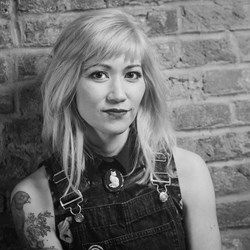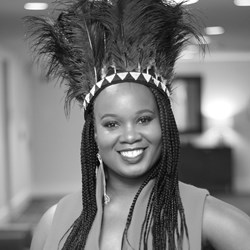Reimagine the Opera Canon
Available on YouTube.com | Watch Now
This series of roundtable conversations investigates how to handle problematic portions of the canon as well as looks for ways to make space for new and different voices.
Part 1
Part 2
Panelists
Dr. Melissa Dunphy
Composer Melissa Dunphy specializes in political, vocal, and theatrical music. She first came to national attention when her large-scale work "The Gonzales Cantata" was featured in The Wall Street Journal, The Atlantic, National Review, Fox News, and on The Rachel Maddow Show, and has been staged as an opera several times. Other notable works include the song cycle "Tesla's Pigeon," which won first place in the NATS Art Song Composition Award, and choral work "What do you think I fought for at Omaha Beach?" which won the Simon Carrington Chamber Singers Competition and has been performed by ensembles including Chanticleer and Cantus. Dunphy is the recipient of a 2020 Opera America Discovery Grant for Alice Tierney, a new opera commission by Oberlin Conservatory set to premiere in 2023. She has been composer-in-residence for the Immaculata Symphony Orchestra, Volti, and the St. Louis Chamber Chorus. In addition to her concert and choral music, she is a Barrymore Award-nominated theater composer and sound designer and is Director of Music Composition for the O'Neill National Puppetry Conference. Dunphy has a Ph.D. in composition from the University of Pennsylvania and a B.M. from West Chester University and teaches at Penn and Rutgers. More at www.melissadunphy.com.
Dr. Michael Mohammed
Michael Mohammed works throughout the US and Canada as a stage director and choreographer. Recently, he co-created What's Known To Me Is Endless with baritone Kenneth Overton and pianist Rich Coburn for the inaugural season of Amplified Opera, a Toronto based company that places equity-seeking artists at the center of public discourse. Additional directing and choreography work includes Le nozze di Figaro, Carmen, Candide, I Pagliacci, and X: The Life & Times of Malcom X. Also active as a performer, recent credits include Bertarido in Rodelinda (Handel Opera Project), Luna Pearl Woolf’s Act Without Words (Bard Music West, world premiere), and the dance film Separate Sentences.
Michael received his doctorate from the Music and Music Education Program at Teachers College, Columbia University. His dissertation explored the use of vocal technique as a means of personal and cultural expression by elite black opera and musical theatre singers. His research continues to look at the representation of persons with marginalized identities in operatic and theatrical performance. He is the Director of the Musical Theatre Ensemble at the San Francisco Conservatory of Music. He is also on the voice faculty at the College of Marin and the San Francisco Community Music Center.
Emily Sung
Emily Sung is the Associate Director of Choirs at Princeton University, as well as a doctoral student in choral music at the University of Southern California. Emily previously served as the Assistant Chorus Master at Opera Philadelphia, helping prepare choruses for the company’s groundbreaking Festival O and numerous other mainstage productions. Emily also previously served as the Director of Choirs at the University of Pennsylvania, the Assistant to the Music Director of the Pennsylvania Ballet, the director of the Singing City Children’s Choir, the music director of Opera Philadelphia’s Teen Voices of the City Ensemble (T-VOCE), a singer and co-conductor of the Chestnut Street Singers, and a member of the Temple University conducting faculty. In each arena of her work, Emily is committed to lifting up the voices and stories of marginalized and minority people. She is a passionate advocate for equal access and radical progressive change in the choral arts. Emily grew up in New Jersey, surrounded by a large and loving extended family of Chinese and Taiwanese immigrants. She earned her AB in history at Princeton University and her MM in choral conducting at Westminster Choir College.
Tanyaradzwa Tawengwa
Tanyaradzwa Tawengwa is a Zimbabwean gwenyambira, composer, singer and scholar whose storytelling serves to bridge Zimbabwe’s past and present, in order to inform a self-crafted future. Her craft lives at the intersection of music and healing, drawing from the generations of Svikiro (spirit mediums) and N’anga (healers) in her bloodline. Tawengwa is also the founder and music director of the Mushandirapamwe Singers, a Pan-African vocal ensemble.
As a scholar, Tanyaradzwa's research focuses on restorative justice in the canon, that is, resurrecting the voices of Black composers whose works have been silenced due to systemic racism. Her dissertation is a scholarly, performance edition of "Trouble in Mind: A Slave Opera" by Edward Boatner (1898 -1981). This past summer, Tanyaradzwa penned "Opera is Racist": a viral, social media post detailing her experience as a Black singer in a leading Young Artist Program.
As a composer, Tanyaradzwa's creative process prioritizes African modalities of knowledge (re)production and transmission. Orature, aural learning and aural scores are the maps she provides collaborators as guidance to arrive at healing, ritual-based performance practices that make space for the performer's own creative voice to be heard.
Tanyaradzwa earned her B.A. in Music Composition at Princeton University (cum laude), her M.M. in Voice Performance from the University of Kentucky and is currently a doctoral candidate in Voice Performance at the University of Kentucky. https://www.mushandirapamwe-singers.com/bio




